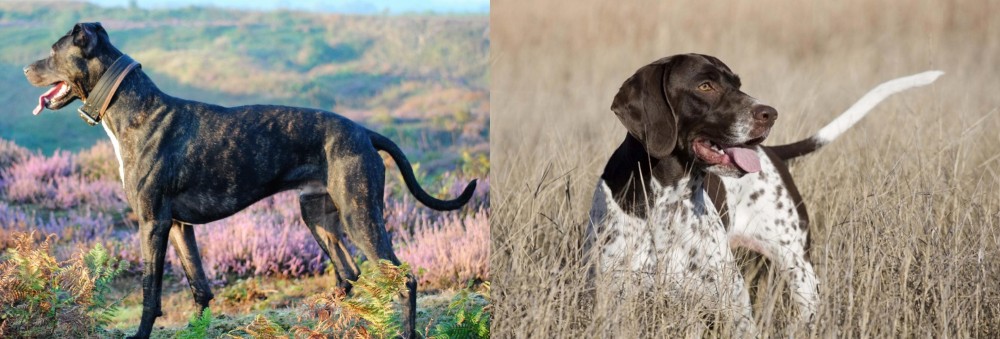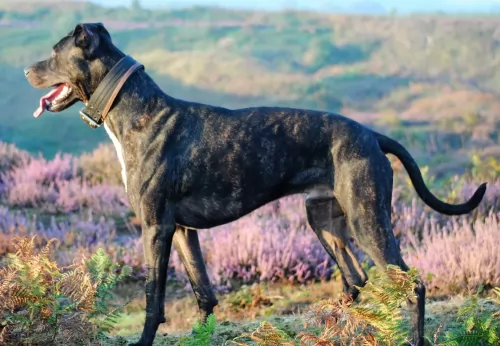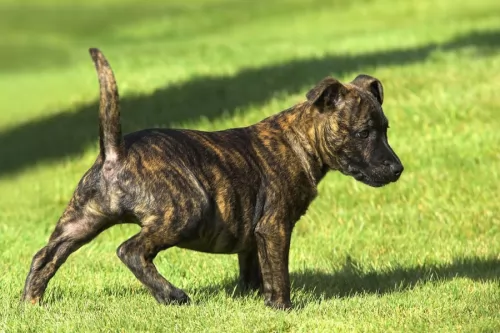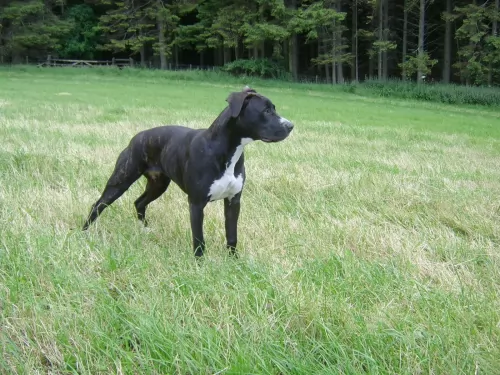 Petzlover
Petzlover Alaunt is originated from Afghanistan but Old Danish Pointer is originated from Denmark. Alaunt may grow 25 cm / 10 inches higher than Old Danish Pointer. Alaunt may weigh 33 kg / 73 pounds more than Old Danish Pointer. Both Alaunt and Old Danish Pointer has almost same life span. Alaunt may have more litter size than Old Danish Pointer. Both Alaunt and Old Danish Pointer requires Low Maintenance.
Alaunt is originated from Afghanistan but Old Danish Pointer is originated from Denmark. Alaunt may grow 25 cm / 10 inches higher than Old Danish Pointer. Alaunt may weigh 33 kg / 73 pounds more than Old Danish Pointer. Both Alaunt and Old Danish Pointer has almost same life span. Alaunt may have more litter size than Old Danish Pointer. Both Alaunt and Old Danish Pointer requires Low Maintenance.
 Alaunt is an extinct breed that existed 3000 years ago since 300 years ago. They were very popular dogs and people used them for many different tasks. They were a perfect working dog, but also they were used for wars and many other situations. Since the migrating was very common through the history, there were many different Alaunt breeds all over the Europe and Asia. Alaunt originated from central Asia, probably Afghanistan.
Alaunt is an extinct breed that existed 3000 years ago since 300 years ago. They were very popular dogs and people used them for many different tasks. They were a perfect working dog, but also they were used for wars and many other situations. Since the migrating was very common through the history, there were many different Alaunt breeds all over the Europe and Asia. Alaunt originated from central Asia, probably Afghanistan.
 Hailing from Denmark, the Old Danish Pointer originates back to 1710 and has been used as a pointing breed for finding game.
Hailing from Denmark, the Old Danish Pointer originates back to 1710 and has been used as a pointing breed for finding game.
Today they are essentially used as pet companions. Morten Bak mated local farm dogs with gypsy breeds, leading to the development of piebald purebred dogs. These were named Old Danish Pointers.
 Weight of the Alaunt variates and it depended from dog to dog. The average weight of this breed was 20-68kg. While their height was 56-85cm. Females were slightly smaller with an average weight of 16-60kg, with a height of 50-80cm.
Weight of the Alaunt variates and it depended from dog to dog. The average weight of this breed was 20-68kg. While their height was 56-85cm. Females were slightly smaller with an average weight of 16-60kg, with a height of 50-80cm.
A lifespan of Alaunt was 10-12 years. Litter Size of an average Alaunt was 6-10 puppies.
Other Names for Alaunt are White Kazbegi, White Balkan dogs, Alaunt Gentil, Alaunt de Boucherie, Boucherie
 The Old Danish Pointer is a medium-sized, purebred dog standing at between 50 and 60cm in height and weighing between 26 and 35kg.
The Old Danish Pointer is a medium-sized, purebred dog standing at between 50 and 60cm in height and weighing between 26 and 35kg.
This beautiful dog is muscular and lean with a broad head, floppy ears and a long thin tail. The coat is smooth and short haired and is white with large reddish brown patches as well as some freckling.He is an average shedding dog.
He has dark brown eyes. He is amicable and gets on well with children in the home as well as with other dogs. Even so, it is best to have him trained and socialized as he becomes obedient and more amicable than he already is. If you decide to go in for breeding your dog, you can expect 4 to 6 puppies.
Quiet, calm and steady, the Danish Pointer is also stubborn, and this is why training and socialization is so important for him.
Outdoors and perhaps on a hunt he becomes highly animated and alive, but back home with his family he is a calm, loving, devoted family pet and loves spending time with his human family. He forms a close bond with his human owner and when he is well trained, he likes to please his owner.
He is intelligent too and finds learning new things easy.
 This breed was very powerful. They could adjust to any climate without any problems. Alaunt needed a lot of exercises because they were very strong and active dogs. They were also very intelligent dogs who knew what it wanted. People loved this breed because they were very smart, but also the perfect companion in every situation. Very protective but kind breed was loved in many countries.
This breed was very powerful. They could adjust to any climate without any problems. Alaunt needed a lot of exercises because they were very strong and active dogs. They were also very intelligent dogs who knew what it wanted. People loved this breed because they were very smart, but also the perfect companion in every situation. Very protective but kind breed was loved in many countries.
 Not only is the Old Danish Pointing Dog an excellent hunter, he is also friendly and loving when he is just being a pet.
Not only is the Old Danish Pointing Dog an excellent hunter, he is also friendly and loving when he is just being a pet.
These dogs are quiet, amicable pets enjoying the time they spend with their human family. He is low maintenance, he gets on well with children and other pets and he doesn’t spend his time barking endlessly at nothing.
When you take this well mannered, quiet, loving dog into your home, you can be prepared to have up to 14 brilliant years of companionship from him.
 The Old Danish Pointer is a healthy dog and you’re not likely to be spending too much time at the vet with him.
The Old Danish Pointer is a healthy dog and you’re not likely to be spending too much time at the vet with him.
However there are always dog illnesses that you need to look out for, and hip dysplasia is always on the top of the list.
While this disease is more prevalent in larger dogs, it can strike smaller dogs too, and in fact dogs of any age. This is a condition where the hip joint doesn’t form properly, so that arthritis and inflammation sets in. It is very sad as you notice your once active dog becoming increasingly immobilized with pain and discomfort.
Eye infections can include entropion and ectropion – conditions where the eyelids irritate the surface of the eye.
Ear infections too, can cause your pet a lot of distress and he will shake his head and scratch his ears. Inside the ears, it will be red and possibly there will be a discharge. This is also more prevalent among dogs with floppy ears. The idea is to try and keep the inside of the ears clean and dry.
 With his short coat, the Old Danish Pointer is looked upon as a low maintenance breed. You can brush him twice a week and at the same time check him over for fleas and ticks, ear and eye infections as well as dental infections.
With his short coat, the Old Danish Pointer is looked upon as a low maintenance breed. You can brush him twice a week and at the same time check him over for fleas and ticks, ear and eye infections as well as dental infections.
Check his nails too, as many dogs have been injured when their long nails have hooked onto things and ripped open the flesh. When he gets used to it, your pet will find these grooming sessions therapeutic and relaxing, loving the bonding time you spend with him.
Your beautiful Old Danish Pointer loves to spend time outdoors and he is far better suited to life in the countryside and in the suburbs as opposed to life in the city. Give him the chance to take part in a hunt, and he’ll relish it. He also loves long walks where he can even perhaps be let off the leash as well as the chance to go swimming. He is at his happiest when he is tired at the end of the day from hiking, running, swimming and camping.
You can conveniently feed your Old Danish Pointer from the top quality commercially manufactured foods. Just be sure to check the labeling as you want to be sure he gets in the right amount of vitamins and minerals and avoids those foods high in colorants, preservatives and useless fillers.
Keep your dog’s diet simple and nutritious and try to add in some homemade food to his kibble from time to time. Boiled chicken, brown rice or pasta and some cooked vegetables such as sweet potatoes, spinach and carrots will keep him healthy and active. You can also try to include some raw meat occasionally.
Make sure he always has access to cool, fresh drinking water.